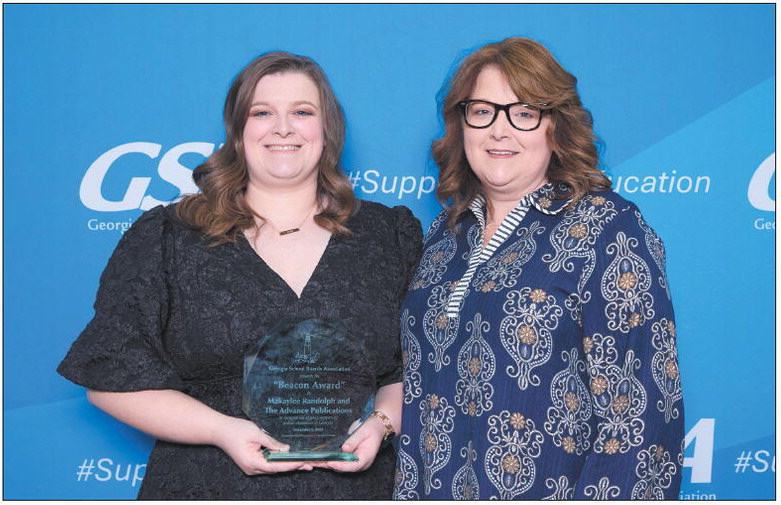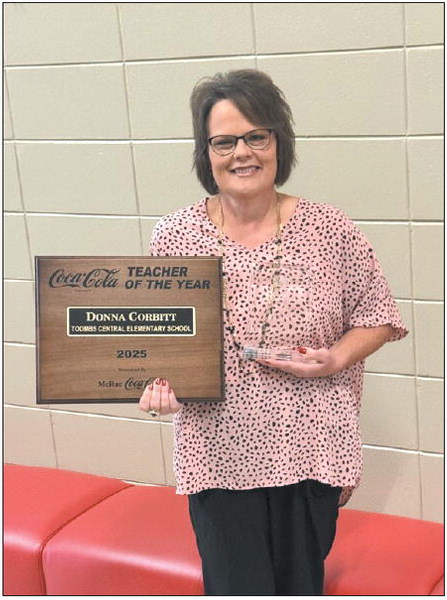Board of Elections Denies Wardlaw’s Petition
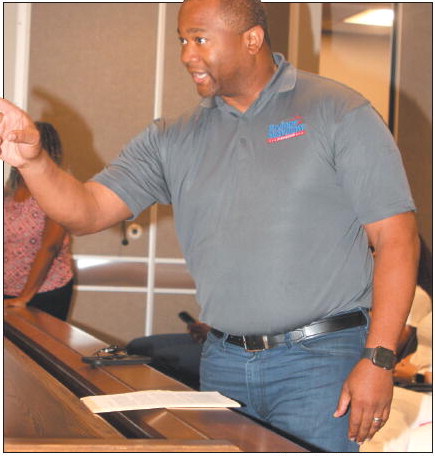

Toombs County Courthouse Courtroom 2C was filled with citizens and supporters of Sheriff Candidate Rodney Wardlaw on Tuesday, July 16, as the Toombs County Board of Elections voted to deny Wardlaw’s petition to be placed on the ballot as an independent candidate.
Toombs County Election Superintendent Carey Alligood began the meeting by explaining that the meeting had been called as a hearing to determine whether or not Wardlaw’s petition met the criteria for him to be an independent candidate on the ballot, as Wardlaw previously submitted all qualification documents and payments in March, enabling him to be listed as a qualified candidate by the Elections Office, but needed to submit a petition to join the ballot.
County Attorney Blake Tillery clarified this requirement, saying, “You can have your name listed on the ballot one of two different ways: you qualify through a party – usually a republican or democratic party – and there are strict rules for that. You have to qualify by a certain period of time, you have to pay a fee, and the check has to cash. We’ve had candidates before whose check bounced and they were removed from the ballot. There is strict compliance and the nomination proceedings close at a certain time. We are not dealing with that [Georgia Code] section today though – we are only dealing with the code section that deals with if someone is not a member of a political party and wishes to then continued from page
appear with their written name on the ballot.”
According to Tillery, Alligood reached out to him on July 9 to learn more about the requirements of a petition for an independent candidate. Upon this request, Tillery went through code sections 21-2-170 and 171 that deal with the issue, and created a concise document to help the Board of Elections evaluate the petition. The rules in this document included: Each person signing the petition must be a registered voter of the county of the candidate, and must provide their signature and address (street number and name, city). The signer’s date of birth is optional to include, but is urged.
The top of each petition sheet should have the candidate’s name and occupation, address, office that is being sought, who the petition would be filed with, and the name and date of the election.
Each sheet should be numbered at the foot of each page.
A notarized circulator affidavit should be included at the bottom or back of each sheet.
Sheets must not have circulated more than 180 days.
Sheets must be on similar types of paper and bound together.
The Election Superintendent must examine and determine if it has errors or defects, alterations, or the correct amount of signatures.
The Election Superintendent may hire people to help review petition from within her office.
“The Code is pretty straight forward – though, I say that and I have been a lawyer for 14 years, so it may be a little more straightforward to me,” Tillery commented. “I had to look at the whole code. I began looking at 170 and 171, and developed a memo for how, based on the code, to evaluate the petition. This is not a new thing – it dates back to rulings made by the Attorney General in 1972. My interpretation would actually allow the election superintendent to make the decision unilaterally. But in this instance, since there is a Board of Elections, the election superintendent wants to place that in your hands as the custodian of the Board of Elections for our county. The fact that we are here is simply trying to be open in government.”
Alligood then elaborated on the situation. “We had 15 circulators turned in to us. Everything was bound together by paper clip, so that was one of my issues – what does [the code] consider bound together? But when it was presented to me, the sheets were staggered in a certain order as the circulator petition was on top,” she told the Board. “I took the circulator petition that was on top, bound them back with a paper clip, then started going through the signatures, which is always very time consuming because we do have to pull out the cards. As we were doing it, me and Anna Lee were both asking questions like, ‘Okay, someone gave me a P.O. Box – that’s not a residence.” Then, the next question was, “Well someone gave a cell phone number. The signature matches, does this count?’” She continued, “We went back and read what Blake gave us, and after three nights of working on this, we realized on Thursday night that the addresses were going to be key. So, before we finished – we did not complete all of the signatures; I will say that up front – we had to go to the addresses because if the addresses weren’t verified, if they weren’t complete, it was a moot point then. So, regardless of the circulating [note] and it not being attached at the bottom or on the back, we went to the addresses and the addresses just weren’t complete.”
“I went through and checked each and every one of them; Anna Lee went through and highlighted all of the ones that she had, and we came up with 391 incomplete addresses – that is whether they are missing the city, they put ‘same’ if there was a spouse, they did not put a house number, or they only put a cell phone number. It was a sundry of things that we started picking up. At that point, I realized that the signatures were something that we just had to stop at and see where we were at. That’s when we reached out to Blake and I asked him, ‘Where do we go from here? This is not meeting the requirements that are laid out for us; where do we go?’ So, that’s where we are. However this is determined, we are more than glad to go back and finish out the signatures, but the hearing here today is to determine whether the sheets meet the requirement by the law, if the addresses meet the requirement, and from what I can tell, we have 391 that are incomplete,” Alligood concluded.
Board of Elections Chairman Troy Reddick asked the superintendent if the criteria for the petition had been met besides the signatures and addresses, to which Alligood shared that it had not. “We’re obligated by law to follow code,” he remarked before the Board voted unanimously to deny the petition and subsequently adjourned.
After adjournment, Tillery and Alligood began discussing the situation with attendees, as the public shared their disapproval of the vote.
Supporters of Wardlaw explained that Alligood had misinformed the candidate on the requirements of the petition on multiple occasions.
“I think that it is necessary that these individuals that have signed the petition, and nearly 1,000 others, need to understand that the information was not given properly at the beginning,” Luther Wardlaw told the Board. “When Rodney came to qualify, he should have been given the proper instructions – the proper directions. It was not done. At first, he was told it was 1% [of voter population needed], and then he was told it was 5% [of voter population needed]. Then, he was told that you have to have signatures of individuals only registered in 2020; come to find out, that was not the case. If the truth had been told from the beginning, there would have been 2,000 signatures on the paper. But, we were handicapped from the beginning, and that’s not right. The superintendent failed to let Rodney know all of the rules, and whenever we came in, she was honest and said, ‘I didn’t know because we never had to do an independent candidate before, so I’m calling to ask questions now.’ Ladies and gentlemen of the Board, the time to ask questions would have been whenever he paid the money to qualify months prior – not on the day that was the end. Not on the day that was the final day to turn everything in – that’s not when you give the instructions. This isn’t right. The best thing to have done was to certify these signatures understanding that you asked for 806; we gave you 1,000.”
He continued, “We always want to abide by the law – we don’t want to break the law. You have to understand that if a candidate comes in and qualifies, pays the finances necessary – we only have what the superintendent gives us; we don’t know. So, if she says that something has to be done this way – or if we bring it in and she doesn’t tell us – how are we supposed to know? We weren’t trying to do anything illegal; we were here when the call was made to the Secretary of State when the Secretary of State said that as long as they were in the county, it did not matter. And now it changes. Her instructions have changed, Attorney Tillery.”
Tillery responded to this comment, saying, “I beg to differ. That never changed. I do think it was important to note that the code law was set up in 2001. The election superintendent is not the attorney for the candidate.”
More citizens echoed the frustration of misinformation. “Senator Tillery gave the information to the Superintendent on the 9th – the day that the final petition was due. You received information on the 10th, and he received information on the 11th. All of the information should have been given at the very offset. He should have gotten that at the very beginning,” Carl Wardlaw Jr. emphasized. “How is he supposed to know what is going on? I’ve worked in the prison system; I’ve worked in several places. This is so unprofessional.”
“The reason the memo was written on the 10th is because the petition was filed on the 9th, and the memo was written for the purpose of reviewing the petition. Prior to the filing of the petition, there was nothing for the board members to review. The memo was not written for candidates; it was written for the board and the review of the petition. Nothing in this prohibits any candidate from still running as a write-in. The only thing this bars is the printed name on the ballot, and the reason that the code requires this is because there is a requirement to have your name printed on the ballot,” Tillery clarified. “I don’t expect people to like the decision, but I think that anyone who says that we did not follow the code would be mistaken in allowing their emotions to overrule reality. The official code of Georgia has been published for however long. It is available because of the Georgia General Assembly for free on any website.”
Citizens then began asking why the Election Superintendent had not had the code or referred Wardlaw to the code when he asked questions about how to go about crafting the petition. One citizen even cited the election superintendent’s job description, which reads, “The supervisor would have knowledge of the Georgia election code and the rules of the state election board and the principles and practices of records management, and to provide examples and guidance to those that come to them to ask for support.”
Alligood explained that from the beginning, she was unsure of the exact method of the petition because of never having dealt with an independent candidate. She said that she encouraged Wardlaw to reach out to the state, as she did herself, but received no information from state officials. Wardlaw shared that he had also attempted to contact the state to learn more about the petition, but did not receive a reply. “If they didn’t get back with you and you’re an election superintendent, what makes you think they would get back with me?” he questioned.
Wardlaw continued, sharing that Alligood had told him in previous phone conversations that the Board had the ability to make a decision without state involvement or regulation, which Alligood vehemently denied. He also asked the Board if they had reviewed his written statement that outlined the issues of the misinformation of the situation, which is the option that Alligood provided him to speak at the hearing.
“You are taking a vote away from thousands of people!” a citizen cried out.
The dialogue between the parties continued for several minutes before a final question was asked. “Do you have a copy of the Code in your office?” Tony Wardlaw asked Alligood, who affirmed that she did. “Why did you not guide Rodney to look into it?”
Tillery advised the candidate to submit an appeal to the Toombs County Superior Court on the decision to allow a judge to further review the situation. Wardlaw submitted his appeal on Monday, July 22. A superior court judge will now review the information and make a final decision at a date that will be announced in the future.
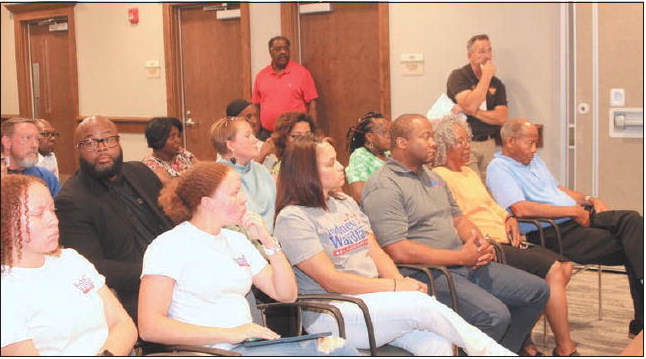
PACKED COURTROOM – Every seat was filled in Courtroom 2C as community members and supporters of Toombs County Sheriff Candidate Rodney Wardlaw attended the meeting of the Board of Elections.Photo by Makaylee Randolph
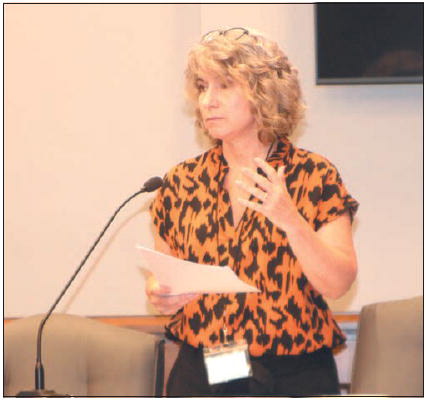
OVERVIEWING THE SITUATION – Toombs County Election Superintendent Carey Alligood provided the Board with an overview of the situation, explaining the areas which she felt Wardlaw’s petition did not meet requirements.Photo by Makaylee Randolph
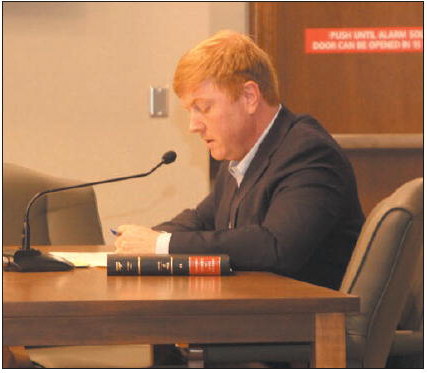
EXPLAINING THE LAW – County Attorney Blake Tillery explains the code law regarding independent candidates to the Toombs County Board of Elections.Photo by Makaylee Randolph



